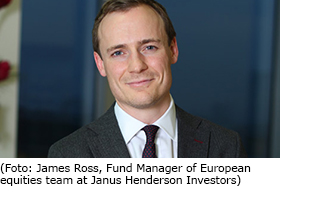
Janus Henderson: Political risks in 2018
Is political uncertainty in Germany a risk for markets? This question follows James Ross, Fund Manager of European equities team at Janus Henderson Investors.
07.02.2018 | 10:19 Uhr
 What are your thoughts on the current political situation in Italy and Germany?
What are your thoughts on the current political situation in Italy and Germany?
To analyse the current political environment in Europe requires some contextualisation. At the start of 2017, European analysts, investors and observers were concerned about a number of political events in the calendar year that could have thrown the European Union (EU) project into disarray, or at the very least clouded the outlook for further integration. We had the Dutch elections in March 2017, characterised by a rise in support for the far right. We had the two rounds of the French presidential election in April and May, which could have brought to power the anti-EU, ‘extreme’ Politician Marine Le Pen. We had the German election in September, with the right-wing Alternative for Germany (AfD) party gaining support, having climbed from obscurity to 12.6% of the vote in a short space of time. The year closed with rumblings of discontent in Spain, and an Italian political outlook that seemed far from clear.
Fast forward to today and the major ‘worst case scenarios’ for investors in European equities have been avoided. However, as ever, political risk remains, with Italy and Germany currently dominating the debate. Italy is still gripped by uncertainty, but there have been a few interesting recent developments. Former Italian Prime Minister Silvio Berlusconi somehow seems to have emerged from the wilderness (he is, of course, still legally barred from holding political office) and is pulling together an increasingly powerful right wing block. The Five Star movement is polling well, but has markedly toned down its anti-EU rhetoric. It is starting to appear that whichever party – or combination of parties – gains power, Italy’s immediate future within the EU should be more assured. This assertion could become more robust if Italy’s economy continues to improve.
There is also lingering uncertainty in the German political situation. For a government to be formed, the Social Democratic Party of Germany (SPD) will need to see a majority of their members vote in favour of a renewed coalition with the Christian Democratic Union/Christian Social Union of Bavaria (CDU/CSU). After only a narrow vote in favour by the SPD politicians, this is by no means guaranteed. However, it does look increasingly likely that a coalition between these parties will be the outcome of the current negotiations. We would view this as a very market-friendly outcome. Not only is Angela Merkel viewed very favourably amongst international investors, but the SPD would bring an ‘EU-friendly’ approach, supporting the EU project as well as binding Germany and France more closely together. As an aside, there is some evidence that, on a medium term view, Germany is moving gradually to the left of centre. If the SPD can find a credible candidate, they could start to dominate again.
Is political uncertainty in Germany a risk for markets?
Although we are firmly of the view that the most likely outcome in Germany is a renewed CDU/CSU/SPD coalition (the most market friendly outcome) there are a few potential scenarios that could rattle markets. If a coalition cannot be formed, Angela Merkel could attempt to press on with a minority government. Alternatively, a new election could be called. This would likely result in another coalition of ‘mainstream parties’, but it would cause some uncertainty in the interim. Either of these ‘market unfriendly’ outcomes could negatively impact equity markets (uncertainty always seems to have that effect), but we would argue that with a robust economic recovery underway in Europe, any equity market setback caused by political concerns would likely be short-lived. A lack of clear German political leadership might potentially stall the EU reform agenda. This could have a more longstanding impact on markets but, ultimately, we are positive towards the prospects of a market-friendly outcome in Germany.
Is the EU more fragile that it was a few years ago, following Macron’s election?
We do not see why the EU is more fragile today than a few years ago. In fact it is arguably the opposite. Economic growth should be in excess of 2% in quite a few countries across the region this year; interest rates and inflation both remain low, government finances are showing a small surplus, consumer demand is up and unemployment down. External factors are at play as well. All economies are likely to be ‘fragile’, if the US and China slide into a deep recession.
The Franco/German alliance should, of course, remain strong, although the leaders of these two European powerhouses are at a different stage in their careers. Macron has just arrived while Merkel is closer to the end of her time as Europe’s de facto political leader (although that end may not arrive for a few more years). One characteristic of note about Macron is that he sees solutions to many of the EU’s (and the world’s) problems, by way of cooperation in preference to isolationism.



Diesen Beitrag teilen: